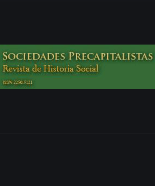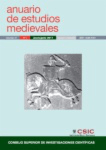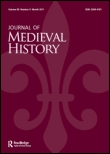
Espacio Tiempo y Forma-Serie III-Historia Medieval
Scope & Guideline
Illuminating the Past: Your Gateway to Medieval Insights
Introduction
Aims and Scopes
- Interdisciplinary Historical Analysis:
The journal employs various methodologies, including archival research, historiography, and critical analysis, allowing for a comprehensive understanding of medieval history. - Focus on Social and Cultural Dynamics:
It emphasizes the social, political, and cultural dynamics of medieval societies, exploring themes such as power relations, community interactions, and cultural exchanges. - Regional Studies and Local Histories:
The journal highlights specific regional histories within the Iberian Peninsula, including the roles of local elites, communities, and institutions in shaping medieval society. - Religious and Ethnic Interactions:
It investigates the interactions among different religious and ethnic groups, including Christians, Muslims, and Jews, and their impact on societal structures and cultural developments. - Gender Studies in Medieval Contexts:
The journal also addresses gender dynamics, examining the roles and representations of women in medieval society, including their influence on politics and culture.
Trending and Emerging
- Cultural Heritage and Identity:
There is a growing emphasis on the exploration of cultural heritage and identity, particularly in relation to the legacies of medieval societies and their relevance to modern cultural discussions. - Economic History and Material Culture:
Recent studies increasingly focus on economic history, including trade, industry, and material culture, illustrating a shift towards understanding the economic underpinnings of medieval life. - Interdisciplinary Approaches:
The journal is witnessing a trend towards interdisciplinary research that integrates methodologies from anthropology, sociology, and art history, enriching the analysis of medieval contexts. - Impact of Religious Transitions:
Emerging themes are focusing on the impact of religious transitions, such as the conversion of Muslims and Jews during the late Middle Ages, and the socio-political repercussions of these shifts. - Environmental History:
The inclusion of environmental history, examining the interactions between medieval societies and their environments, reflects a contemporary interest in sustainability and ecological impacts.
Declining or Waning
- Traditional Military History:
There is a noticeable decrease in publications centered on traditional military history, possibly indicating a shift towards more interdisciplinary approaches that encompass social and cultural dimensions. - Legal History:
While legal history has been a staple of medieval studies, its prominence appears to be declining, as contemporary research increasingly prioritizes social and cultural contexts over legal frameworks. - Narrow Focus on Specific Monarchs:
Research focusing narrowly on individual monarchs or dynasties is less frequent, suggesting a trend towards broader thematic studies that encompass wider societal implications rather than singular historical figures.
Similar Journals

Sociedades Precapitalistas
Revealing the Rich Tapestry of Early SocietiesSociedades Precapitalistas, published by the Universidad Nacional de La Plata, Faculty of Humanities and Educational Sciences, is a distinguished academic journal that specializes in the study of pre-capitalist societies, exploring their structures, cultures, and dynamics. With an ISSN of 2250-5121 and an E-ISSN of 2250-5121, this Open Access journal has been committed to disseminating knowledge since 2011, ensuring that research is accessible to a global audience. Set in La Plata, Buenos Aires, Argentina, the journal serves as a vital platform for researchers, professionals, and students engaged in this niche yet significant field of study. Although specific impact metrics such as H-Index are currently unavailable, its dedication to academic rigor and the relevance of its subject matter highlight its importance for those exploring the socio-economic histories of societies prior to the capitalist era. As the discourse surrounding global history continues to evolve, Sociedades Precapitalistas plays a crucial role in enriching our understanding of past societies and their legacies.

Codex Aquilarensis
Cultivating a Rich Dialogue in Arts and HumanitiesCodex Aquilarensis is a distinguished academic journal published by FUNDACION SANTA MARIA REAL, CENTRO ESTUDIOS ROMANICO, specializing in History and Visual Arts and Performing Arts. With an ISSN of 0214-896X and an E-ISSN of 2386-6454, this journal has carved its niche within the scholarly community in Spain, encompassing a range of topics pertinent to its fields of study. Although it currently holds a Q4 category in both History and Visual Arts and Performing Arts as of 2023, it plays a critical role in disseminating important research and insights from 2015 to 2022, contributing to the academic dialogue around these disciplines. While access options are limited, the journal's commitment to enhancing understanding in the arts and humanities makes it a valuable resource for researchers, professionals, and students alike. Its ranking within Scopus further underscores its relevance, positioning it within the competitive landscape of arts and humanities research. Scholars and practitioners interested in historical and artistic studies are encouraged to engage with the content presented by Codex Aquilarensis as it continues to evolve and contribute to the intellectual heritage of the region.

Studia Historica-Historia Medieval
Illuminating the Past: Your Gateway to Medieval ScholarshipStudia Historica-Historia Medieval, published by EDICIONES UNIV SALAMANCA, is a premier open-access journal dedicated to the field of medieval history. Since its inception in 1983, this Spanish journal has provided a platform for scholars to disseminate innovative research, analyze historical trends, and foster academic discourse within the broader historical context. With an impressive ranking of Q1 in History and a notable position within the Scopus Arts and Humanities ranking (Ranked #473 out of 1760, 73rd percentile), Studia Historica stands out as a vital resource for researchers, professionals, and students alike. The journal embraces a wide spectrum of topics related to medieval studies and offers open access to its articles, facilitating the global exchange of knowledge and ideas. With a commitment to rigorous peer review, it aims to uphold high academic standards and contribute significantly to the historiography of the medieval period.

Anuario de Estudios Medievales
Fostering Scholarly Dialogue on Medieval InsightsAnuario de Estudios Medievales is an esteemed academic journal dedicated to the field of Medieval Studies, published by the Consejo Superior de Investigaciones Científicas (CSIC) in Spain. With an ISSN of 0066-5061 and an E-ISSN of 1988-4230, the journal has been offering open access to researchers since 1996, fostering a collaborative and inclusive scholarly environment. Recognized for its high impact, it holds a commendable Q1 ranking in History as of 2023, reflecting its influence in the academic community. The journal encompasses a rich array of topics within medieval history, making it a vital resource for historians, scholars, and students alike who seek to explore and understand the complexities of the medieval period. With its indexed presence in Scopus, where it ranks 557th among 1760 in the Arts and Humanities category, Anuario de Estudios Medievales stands as a cornerstone publication, bridging historical inquiry and contemporary research in Medieval Studies.

Espana Medieval
Bridging Cultures through Medieval Spanish ScholarshipEspana Medieval is an esteemed academic journal dedicated to the exploration of medieval studies within the broader historical context of Spain. Published by the UNIV COMPLUTENSE MADRID, SERVICIO PUBLICACIONES, this peer-reviewed journal has established its reputation since becoming Open Access in 2004, thereby ensuring that vital historical research is accessible to a global audience. With an impressive Q1 ranking in History and a notable Scopus rank of 773 out of 1760, this journal plays a pivotal role in shaping contemporary scholarship in the field. Researchers and professionals can expect high-quality, rigorously vetted articles that delve into various aspects of medieval history, culture, and society, contributing to a richer understanding of the medieval past. Located in the vibrant academic milieu of Madrid, Spain, Espana Medieval continues to be a leading voice for historians, promoting innovative research and fostering academic discourse. Submissions from scholars worldwide are welcomed, encouraging a diverse array of perspectives on the medieval period.

Medievalismo
Exploring the Depths of Medieval CultureMedievalismo is a distinguished academic journal dedicated to the interdisciplinary study of medieval culture, history, and societal influences, published by the esteemed University of Murcia in Spain. Since achieving Open Access in 2010, it has fostered a rich environment for the dissemination of knowledge, encouraging contributions from researchers and scholars across diverse fields. The journal holds a notable Q1 ranking in History and exhibits strong performance metrics in Arts and Humanities and Cultural Studies, as evidenced by its relevant Scopus rankings. With a commitment to promoting high-quality research and discussion, Medievalismo has positioned itself as an essential resource for academics and students aiming to deepen their understanding of the medieval period. Situated in a vibrant scholarly landscape, it continues to publish transformative insights and foster critical dialogue, making significant contributions to the cultural and historical narratives of our time.

Magallanica-Revista de Historia Moderna
Broadening Access to Historical ScholarshipMagallanica-Revista de Historia Moderna is an esteemed academic journal dedicated to advancing the field of modern history, published by UNIV NACIONAL MAR DEL PLATA, FAC HUMANIDADES. Since its transition to an Open Access format in 2015, it has broadened the accessibility of cutting-edge research to scholars and enthusiasts around the globe. With an ISSN of 2422-779X, this publication focuses on significant historical developments, cultural exchanges, and the socio-political transformations that have shaped contemporary society. Nestled in the vibrant city of Mar del Plata, Buenos Aires, Argentina, the journal aims to foster scholarly dialogue and critical analysis among researchers, professionals, and students alike, providing a vital platform for innovative ideas and diverse perspectives in modern historiography. As the journal continues to evolve, it invites contributions that explore the trends, methodologies, and interdisciplinary approaches essential to understanding our shared past.

JOURNAL OF MEDIEVAL HISTORY
Advancing Knowledge in the Realm of the Middle AgesJOURNAL OF MEDIEVAL HISTORY, published by Routledge Journals, Taylor & Francis Ltd, stands as a vital resource in the field of historical studies, focusing on the complex tapestry of the medieval period from 1975 to 2024. With an ISSN of 0304-4181 and E-ISSN of 1873-1279, this journal boasts an impressive Q2 categorization in History, ranking #502 out of 1760 in the Scopus Arts and Humanities rankings, placing it in the top 29% of its field. The journal aims to publish high-quality, innovative research that enhances the understanding of medieval history, making it an indispensable read for scholars, practitioners, and students alike. While it does not currently offer Open Access options, its reputable standing ensures that it reaches a wide audience dedicated to exploring the intricacies of the medieval era. Engage with cutting-edge scholarship and historical insights that collectively contribute to the advancement of medieval studies.

Imago Temporis-Medium Aevum
Fostering Innovative Perspectives on the Medieval EraImago Temporis-Medium Aevum is a distinguished journal published by SPACE POWER & CULTURE- CONSOLIDATED MEDIEVAL STUDIES RESEARCH GROUP, focusing on the rich tapestry of medieval studies within the context of history. Based in the culturally vibrant region of Catalonia, Spain, this journal has established itself as a vital resource for scholars and enthusiasts alike since it adopted an Open Access model in 2007, ensuring that its compelling research is widely accessible. With an impact factor reflected in its Q3 category ranking in the field of History for 2023, and an impressive Scopus rank in the 62nd percentile amongst 1,760 publications, Imago Temporis continues to serve as an incubator for innovative scholarship. The journal's consistent publication history, particularly from 2011 to 2013, 2016 to 2018, and its ongoing commitment through 2024, underscores its dedication to advancing the understanding of the medieval era. Researchers, students, and professionals are encouraged to engage with its unique content, which is poised to challenge traditional perspectives and contribute to the global discourse in medieval studies.

Revista de Historia da Sociedade e da Cultura
Connecting Historical Threads to Contemporary IssuesRevista de História da Sociedade e da Cultura is a distinguished open access journal published by UNIV COIMBRA, FAC LETRAS, dedicated to advancing the field of history. Established in 2014, this journal has become a valuable resource for researchers, professionals, and students, encouraging the critical study of social and cultural history from multiple perspectives. With an E-ISSN of 2183-8615, it remains accessible to a global audience, promoting scholarly communication and collaboration. The journal's commitment to open access since 2016 ensures that high-quality research is available to all without financial barriers. Currently ranked in the third quartile (Q3) in the category of History by Scopus, it holds an impressive position within the academic community, with a Scopus rank of #950 among 1760 journals within arts and humanities, reflecting its impact and relevance in the field. By exploring both historical methodologies and contemporary cultural issues, Revista de História da Sociedade e da Cultura aims to contribute meaningfully to scholarly discourse and foster a deeper understanding of historical contexts, making it a pivotal journal for anyone interested in the ever-evolving narratives of our past.